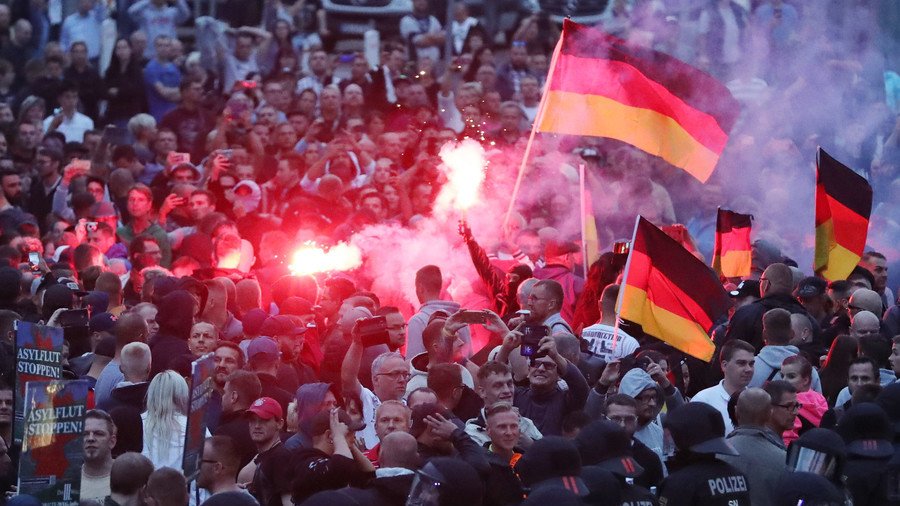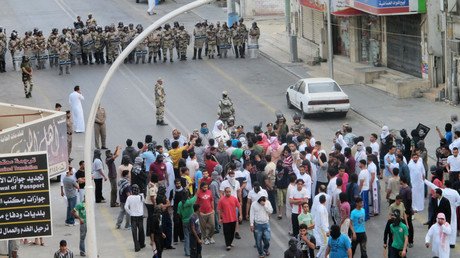20 police & protesters injured in Chemnitz as mayhem over German man’s death hits 2nd day (VIDEO)

Some 20 people, including two police officers, have been injured in fresh unrest between far-right protesters and leftists in the Germany city of Chemnitz. It follows Sunday’s mayhem sparked by the fatal stabbing of a German man.
Police announced new data on the wounded at a news conference on Tuesday, as they briefed the press on the Monday evening unrest. Earlier, they said that people were hurt due to fireworks and other objects being thrown around. Around 600 security forces were deployed to the streets, struggling to keep the estimated 6,000-strong far-right rally separate from the group of 1,500 anti-fascist demonstrators.
Some 43 cases were launched for alleged assaults, use of banned organizations’ symbols, and misconduct on Monday, according to police.
The clashes were a follow-up to a mass protest on Sunday which saw far-right protesters and anti-Nazi counter-protesters hitting the streets of the eastern German city. The anger and frustration were sparked by the death of a 35-year-old German in a brawl that involved around 10 people from “various nationalities.”
An Iraqi and a Syrian have been arrested on suspicion of Sunday’s deadly stabbing.
The rival protests on Monday evening took place on Brueckenstrasse, the boulevard dividing the city center, and saw the opposing groups chanting “Merkel must go,” “Close the borders,” “Nazis out” and “Refugees are welcome here!”
The rally – which saw some far-right activists performing Nazi salutes – had remained relatively peaceful as the protesters initially only jeered at each other under the Karl Marx statue in the former socialist city. It started kicking off at around 9pm when demonstrators started mobilizing. Six people were reportedly injured and several detained by police in the mayhem.
While Merkel's spokesperson quickly sought to condemn Sunday’s violence, Interior Minister Horst Seehofer was slammed for his failure to say anything following days of protests.
Green party member Konstantin von Notz criticized the Christian Social Union (CSU) boss, telling t-online.de: “The fact that Horst Seehofer has been ignoring the incidents in Chemnitz for days is scandalous, and the Federal Interior Minister must ask himself whether the office is still the right one for him.”
The minister eventually broke his silence on Tuesday, two days after the fatal stabbing, which led to riots. Seehofer admitted that the Saxony police are in a “difficult situation” and offered assistance at the federal level “if requested.”
He also expressed his “deepest condolences” to the relatives and the loved ones of the dead man, adding that the sentiments of the people are “understandable.” At the same time, he added that such incidents “by no means justify calls for violence or riots,” which have “no place under the rule of law.”
The rallies come against a backdrop of criticism against Merkel over her ‘open door’ policy, which saw around a million undocumented refugees from Syria and Iraq allowed into Germany at the height of the migration crisis in 2015.
Opposition to Merkel’s migration policy witnessed a serious boost in the aftermath of the Cologne attacks in 2016, when an estimated 1,200 women were sexually harassed or assaulted. Police said many of those responsible were of “Arab or African appearance”, noting Germany had never seen such mass sexual assaults before.
Such anti-migrant sentiment spurred the growth of the right-wing and anti-immigrant movements such as PEGIDA and Alternative for Germany Party (AfD). The latter entered the national parliament for the very first time with 12.6 percent of the votes last year.
While its supporters were often labelled as ‘Nazis,’ the party maintained that it had nothing to do with the far-right, stressing that the government in Berlin has ignored concerns of the population for too long.
Merkel’s indiscriminate immigration policy has also raised concern refugees increase the risk to national security. Germany’s former intelligence chief last year called for an overhaul of border control to fend off an “uncomfortable” security situation.
August Hanning, who ran Germany’s Federal Intelligence Service (BND) from 1998 to 2005, told Sunday newspaper Bild am Sonntag there is an evident “link between internal security and efficient border control.”
Hanning, who has long been a critic of Merkel’s immigration policies, made the comments following the Berlin Christmas market terrorist attack in 2016. The attack killed 12 and injured more than 50. The perpetrator was Anis Amri, a Tunisian whose asylum application had been rejected.
“I believe everyone involved learned from that case, and things have improved a great deal,” Hanning said last year. “But as long as we let people come into the country without identity papers, without clear identity controls, we will have a big security problem.”
If you like this story, share it with a friend!
















